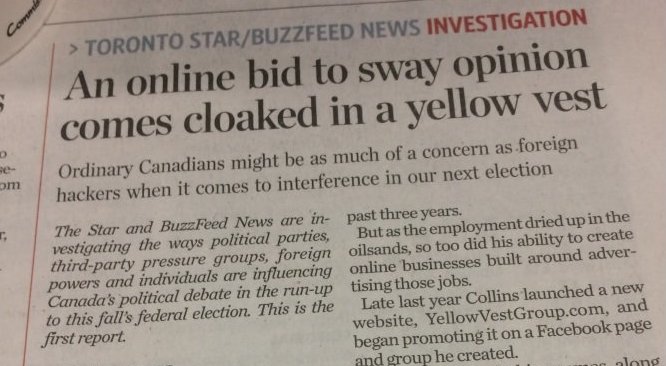
2019 is a general election year in Canada (as it is in many countries around the world), and the Toronto Star wanted to be on top of the misinformation and disinformation efforts that will almost inevitably arise as voting day draws closer.
Star editors didn’t have to start from scratch in getting a handle on the Canadian media environment. They had a good resource not too far away: Craig Silverman and Jane Lytvynenko, the misinformation/disinformation/fake news/hoax reporting duo of BuzzFeed News, who are both based in Toronto. The Star and BuzzFeed have officially partnered to cover “the ways political parties, third-party pressure groups, foreign powers, and individuals are influencing Canada’s political debate in the run-up to this fall’s federal election.”
The first story ran last week, in both the print and digital editions of the Star and on BuzzFeed News. Same story, three different headlines: “Never mind the Russians. Democracy’s real social-media threat could be homegrown” for the Star’s website (where it is paywalled), “An online bid to sway opinion comes cloaked in a yellow vest” in the print edition of the paper, and “How a Canadian Yellow Vest site used fake accounts and marketing savvy to monetize outrage” for BuzzFeed News.
“BuzzFeed cornered the market on identifying shady players who are putting bad information out into the ecosystem,” said Alex Boutilier, a national politics reporter for the Star. “We had skills we could combine to provide coverage and service for Canadians that neither side might have had the resources to do alone.”
Silverman and Lytvynenko noted that the partnership gave them the chance to look at misinformation in a Canada-specific context, something they’re not always able to focus usually since they have a global mandate. “We try to know as much about the internet as possible, but we don’t do a lot of candidate-specific reporting,” Silverman said. “Marco [Oved, an investigative reporter at the Star] and Alex are extremely well-sourced, dogged reporters specific to Canada. It was a natural fit.”
“We’re not necessarily looking at purely fake information put out there,” said Lytvynenko. “We’re looking at the strategies the left and right are using to build up their bases, how they’re talking about the news, what they’rel eaving out, what networks are currently operating in [Canada] and how they’re using the elections as an opportunity to bolster their presence in the country.”
The two outlets aren’t strangers to collaborative publishing — the Star has done co-investigations with the CBC and ICIJ for the Panama Papers, among others, while BuzzFeed’s past reporting partners have included ProPublica and the BBC — and both sides went into this collaboration with the objective of “100 percent sharing,” Boutilier said. “If it appears in our paper, it’s going to appear in BuzzFeed, and vice versa, though obviously BuzzFeed can do different things on the website that we might not be able to do.”
Silverman agreed: “When you do an editorial partnership, you should just be sharing everything. Don’t hold back reporting or information. When you publish, publish the same version at the same time.”
And no money changed hands in this partnership, he added. “Just working together on all stories and publishing together. Very Canadian and polite.”
— “Hands across America: How to make local/national journalism collaborations work.”